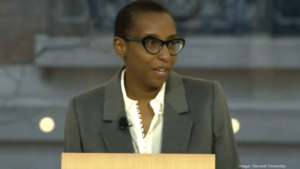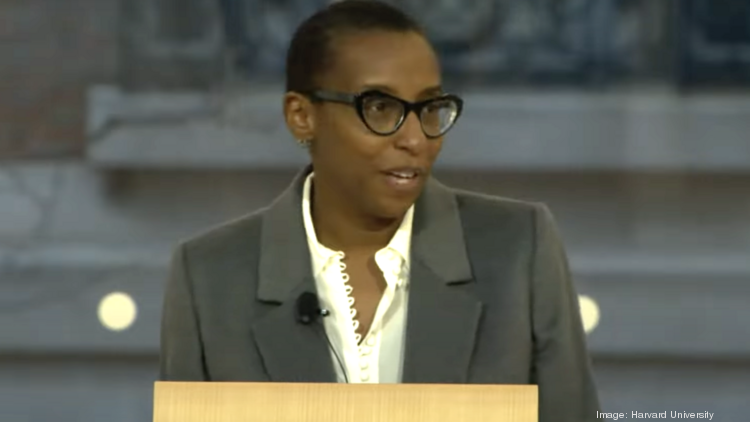Author’s note: Shortly after my article on Claudine Gay was published, she resigned the presidency of Harvard.
Article published in the Philadelphia Business Journal on January 1, 2 024.
Harvard president Claudine Gay has been under fire ever since her disastrous tone-deaf Dec. 6 Congressional testimony. In that testimony, she stated that calling for the genocide of Jews was context dependent, as did Liz Magill, president of UPenn and Sally Kornbluth, president of MIT. Shortly after that Congressional hearing, Magill resigned her position.
All three presidents failed to recognize their responsibility to protect their Jewish students. Free speech that incites violence, whether it be in the form of threatening words or actions, never trumps the safety of all students. Never.
On Dec. 12, the Harvard Corporation, the 12 member governing board of the University, described by The New York Times as “secretive,” released a statement expressing its support for Gay: “As members of the Harvard Corporation, we today reaffirm our support for President Gay’s continued leadership of Harvard University.”
On Dec. 28, The Harvard Crimson reported that legal advice to Gay prior to her Congressional testimony was provided by the law firm WilmerHale, the firm of former Harvard Corporation member William Lee. The Crimson also reported that the crisis communications firms hired by the University were sidelined.
The Corporation should have avoided the appearance of conflict of interest and not hired WilmerHale. Why was the advice of the crisis communications firms not considered?
The support of the Harvard Corporation for Gay is being tested in light of plagiarism allegations against Gay’s 1997 doctoral thesis and her scholarly publications. In October, the Corporation commissioned a committee which included outside independent members to review the allegations against her.
Quoting from the Dec. 12 statement by the Harvard Corporation, the review “revealed a few instances of inadequate citation. While the analysis found no violation of Harvard’s standards for research misconduct, President Gay is proactively requesting four corrections in two articles to insert citations and quotation marks that were omitted from the original publications.”
After the above statement was released by the Harvard Corporation, as many as 40 alleged instances of material not properly cited in Gay’s work have come to light, as reported by The Washington Free Beacon. The Beacon referenced an unsigned letter addressed to Harvard Faculty of Arts and Sciences Research Integrity Officer outlining each of the 40 alleged instances. If factual, Gay’s inadequate citation issues are more serious than the Harvard Corporation originally believed.

How is plagiarism by students addressed at Harvard? In a Dec. 22 article in the Atlantic, Elliot A. Cohen, a Harvard alum and then member of the administrative staff, describes how Harvard addressed the issue of plagiarism while he was at the University. Cohen writes, “Plagiarists, … —those who had lifted someone else’s language without quotation marks or citation—were bounced from the college for a year. … They would be readmitted after submitting a statement that examined their original misdeed and reflected on it.”
Quoting Harvard Law Professor Alan Dershowitz, “I represented a senior who was applying to medical school. He was dyslexic, and so the school provided him with a secretary under the Americans with Disabilities [Act]. He submitted a paper, which had handwritten footnotes. But the secretary forgot to put the footnotes in, and he was disciplined.
“And when we argued that … it was an accident, it wasn’t reckless, it was just a mistake, the university administration said there’s no such thing as an honest mistake when it comes to plagiarism, it’s absolute liability, the student has an obligation to make sure that all the citations are correct.”
Carol Swain, a former Vanderbilt University professor whose work Gay inadequately cited, has called for Gay’s termination. Like Gay, Swain is Black. In a post on X (formerly known as Twitter), Swain in part stated, “Stop listening to the apologists for plagiarism. Fire Claudine Gay posthaste.”
Is there a double standard for academic integrity at Harvard? If a student were to inadequately cite the works of others, would that student be treated worse than Gay by Harvard faculty?
Early admission applications for the entering freshman class of 2024 have fallen by 17%. Major donors have paused their gifts to Harvard. Harvard’s reputation has taken a hit.
The decline in applicants and major gifts is primarily due to the antisemitic atmosphere and what some on the right of the political spectrum claim to be a doctrinaire “woke” culture at Harvard, nurtured by Gay. They claim that Gay was not the best choice for president, but was chosen for her commitment to diversity, equity and inclusion. This should never happen. Leaders should be chosen because they are the best individual for the job.
University leaders need to earn the trust and confidence of not only those on campus, but also the wider community. They must have credibility. They also need to hold themselves accountable to the same standards they hold others. As days pass, it becomes more apparent Gay is failing her leadership responsibilities. If she survives, she will be a significantly damaged leader. For the good of her university, she needs to resign.
Stan Silverman is founder and CEO of Silverman Leadership and author of “Be Different! The Key to Business and Career Success.” He is also a speaker, advisor and widely read nationally syndicated columnist on leadership. He can be reached at Stan@SilvermanLeadership.com.

